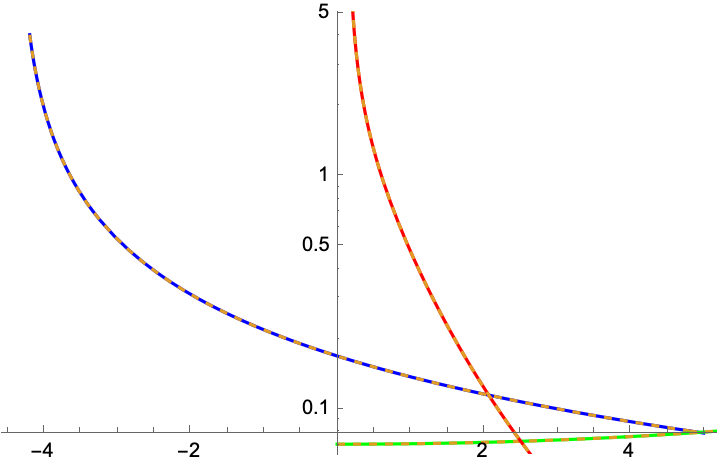Edit2 corrected error in cc2 and int2
Now for some paramter values int1 is valid, for other int2 and for some int1 yield wrong complex solutions. See Manipulate...
Edit
Of course straightforward integration should give the right result. But it does not. This is a bug !
Nevertheless found a way to elict the right result, but still some partly wrong answer in conditions remain.
Split the integrand with Apart.
f[a_, b_, c_] =
1/((-(a - I b) + (x + I c)^2) (-(a + I b) + (x - I c)^2));
fap = f[a, b, c] // Apart
(* (-I b + 4 c^2 + 2 I c x)/(
2 (b^2 - 4 a c^2 - 4 c^4) (-a - I b - c^2 - 2 I c x + x^2)) + (
I b + 4 c^2 - 2 I c x)/(
2 (b^2 - 4 a c^2 - 4 c^4) (-a + I b - c^2 + 2 I c x + x^2)) *)
cc1 = ComplexExpand[fap[[1]], TargetFunctions -> {Re, Im}] //
Simplify[#, Assumptions -> c > 0 && a > 0 && Element[b, Reals]] &
(* (I (b + 4 I c^2 - 2 c x))/(2 (b^2 - 4 c^2 (a + c^2)) (a +
I b + (c + I x)^2)) *)
cc2 = ComplexExpand[fap[[2]], TargetFunctions -> {Re, Im}] //
Simplify[#, Assumptions -> c > 0 && a > 0 && Element[b, Reals]] &
(* (b - 4 I c^2 -
2 c x)/(2 (b^2 - 4 c^2 (a + c^2)) (I a + b + I (c - I x)^2)) *)
int1[a_, b_, c_] =
Integrate[cc1, {x, -\[Infinity], \[Infinity]},
Assumptions -> c > 0 && a > 0 && Element[b, Reals]] //
FullSimplify[#,
Assumptions -> c > 0 && a > 0 && b \[Element] Reals] &
(* ConditionalExpression[-((2 c \[Pi])/(
b^2 - 4 c^2 (a + c^2))), -c - Im[Sqrt[a + I b]] <
0 && -c + Im[Sqrt[a + I b]] <
0 && (b <= 2 c^2 || 4 c^2 (a + c^2) > b^2)] *)
int2[a_, b_, c_] =
Integrate[cc2, {x, -\[Infinity], \[Infinity]},
Assumptions -> c > 0 && a > 0 && Element[b, Reals]] //
FullSimplify[#,
Assumptions -> c > 0 && a > 0 && b \[Element] Reals] &
(* ConditionalExpression[((b + 2 (Sqrt[a - I b] - I c) c) \[Pi])/(
2 Sqrt[a - I b] (b^2 - 4 c^2 (a + c^2))),
b > 2 c^2 && 4 c^2 (a + c^2) < b^2] *)
int1[1, 1, 1] // N
(* 0.897598 *)
nint[a_, b_, c_] :=
NIntegrate[f[a, b, c], {x, -\[Infinity], \[Infinity]}]
nint[1, 1, 1]
(* 0.897598\[VeryThinSpace]+ 0. I *)
Manipulate[{int1[a, b, c] // N, int2[a, b, c] // N,
nint[a, b, c] // Chop}, {{a, 1}, 0, 5}, {{b, 1}, -5, 5}, {{c, 1}, 0,
6}]
$Version (* "8.0 for Microsoft Windows (32-bit) (December 9, 2010)" *)
Edit3
Show, where int1 and int2 are defined.
RegionPlot3D[-c - Im[Sqrt[a + I b]] < 0 && -c + Im[Sqrt[a + I b]] <
0 && (b <= 2 c^2 || 4 c^2 (a + c^2) > b^2), {a, 0, 10}, {b, -5,
5}, {c, 0, 10}]
RegionPlot3D[
b > 2 c^2 && 4 c^2 (a + c^2) < b^2, {a, 0, 10}, {b, -5, 5}, {c, 0,
10}]


r = Simplify[f, Assumptions -> {a, b, c} \[Element] Reals && x > 0];s=Simplify[f,Assumptions->Assumptions->{a,b,c}\[Element]Reals&&x>0&&x<0];r-swhich results in0. $\endgroup$